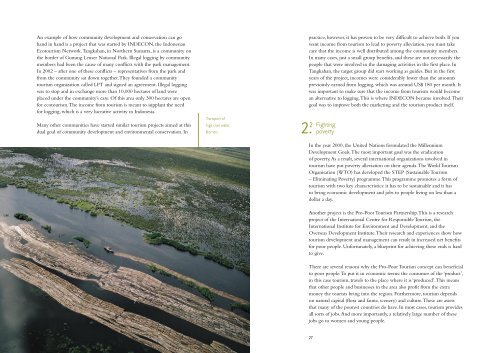OMSLAG 5.indd - IUCN
OMSLAG 5.indd - IUCN
OMSLAG 5.indd - IUCN
You also want an ePaper? Increase the reach of your titles
YUMPU automatically turns print PDFs into web optimized ePapers that Google loves.
An example of how community development and conservation can go<br />
hand in hand is a project that was started by INDECON, the Indonesian<br />
Ecotourism Network. Tangkahan, in Northern Sumatra, is a community on<br />
the border of Gunung Leuser National Park. Illegal logging by community<br />
members had been the cause of many conflicts with the park management.<br />
In 2002 – after one of these conflicts – representatives from the park and<br />
from the community sat down together. They founded a community<br />
tourism organization called LPT and signed an agreement. Illegal logging<br />
was to stop and in exchange more than 10,000 hectares of land were<br />
placed under the community’s care. Of this area only 300 hectares are open<br />
for ecotourism. The income from tourism is meant to supplant the need<br />
for logging, which is a very lucrative activity in Indonesia.<br />
Many other communities have started similar tourism projects aimed at this<br />
dual goal of community development and environmental conservation. In<br />
Transport of<br />
logs over water,<br />
Borneo 2.<br />
2<br />
26 27<br />
practice, however, it has proven to be very difficult to achieve both. If you<br />
want income from tourism to lead to poverty alleviation, you must take<br />
care that the income is well distributed among the community members.<br />
In many cases, just a small group benefits, and these are not necessarily the<br />
people that were involved in the damaging activities in the first place. In<br />
Tangkahan, the target group did start working as guides. But in the first<br />
years of the project, incomes were considerably lower than the amounts<br />
previously earned from logging, which was around US$ 180 per month. It<br />
was important to make sure that the income from tourism would become<br />
an alternative to logging. This is where INDECON became involved. Their<br />
goal was to improve both the marketing and the tourism product itself.<br />
Fighting<br />
poverty<br />
In the year 2000, the United Nations formulated the Millennium<br />
Development Goals. The most important goal was the eradication<br />
of poverty. As a result, several international organizations involved in<br />
tourism have put poverty alleviation on their agenda. The World Tourism<br />
Organisation (WTO) has developed the STEP (Sustainable Tourism<br />
– Eliminating Poverty) programme. This programme promotes a form of<br />
tourism with two key characteristics: it has to be sustainable and it has<br />
to bring economic development and jobs to people living on less than a<br />
dollar a day.<br />
Another project is the Pro-Poor Tourism Partnership. This is a research<br />
project of the International Centre for Responsible Tourism, the<br />
International Institute for Environment and Development, and the<br />
Overseas Development Institute. Their research and experiences show how<br />
tourism development and management can result in increased net benefits<br />
for poor people. Unfortunately, a blueprint for achieving these ends is hard<br />
to give.<br />
There are several reasons why the Pro-Poor Tourism concept can beneficial<br />
to poor people. To put it in economic terms: the consumer of the ‘product’,<br />
in this case tourism, travels to the place where it is ‘produced’. This means<br />
that other people and businesses in the area also profit from the extra<br />
money the tourists bring into the region. Furthermore, tourism depends<br />
on natural capital (flora and fauna, scenery) and culture. These are assets<br />
that many of the poorest countries do have. In most cases, tourism provides<br />
all sorts of jobs. And more importantly, a relatively large number of these<br />
jobs go to women and young people.
















